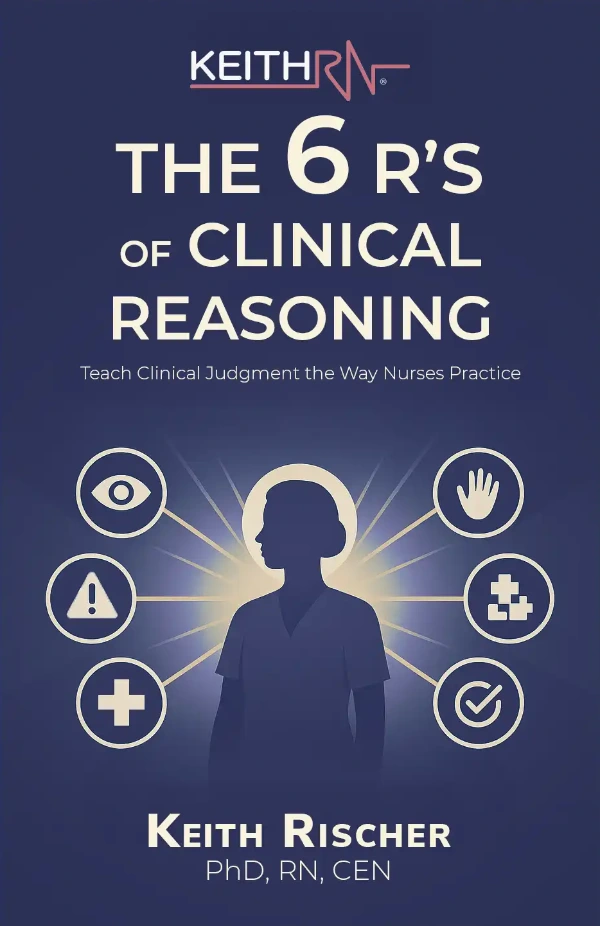
Nurses have one of the highest rates of burnout among all healthcare professionals. (I am sure that nursing students and nurse educators are not far behind!)
No one is immune to the consequences of persistent and sustained stress over time.
Though stress is a part of life, there is only so much “fight or flight” that a person can handle before they begin to become overwhelmed and unable to cope which will ultimately lead to burnout.
But the disastrous consequences of burnout can be avoided, if it is recognized EARLY.
As many are beginning a new school year, NOW is the time to see if the cumulative effects of nursing education are taking a toll not only on nursing students, but also nurse educators.
My Story
As a nurse in practice, I too have experienced the devastating consequences of burnout.
When I started in the ED, I loved the dynamics of this stimulating environment. I was an adrenaline junkie and loved every minute of it.
I began to work more overtime because it was available and more was better right? WRONG!
Over the next year I began to become more tired, exhausted and what I once enjoyed became a burden and began to put in my time and began to focus MORE on how much I was making in OT, not on my patients.
When a small child who had died from SIDS was brought in and was not able to be resuscitated, I was indifferent to the grief and loss of the family. I was totally disconnenected and disengaged.
What had happened? I was at the end of a process commonly referred to as burnout.
Burnout Defined
Burnout has been described as the progressive loss of the initial idealism, passion, energy, and purpose to enter the profession (Edelwich & Brodsky, 1980).
It can also be defined as the loss of human caring, or stated another way the separation of caregiving and caring (Benner & Wrubel, 1989).
When a nursing student or nurse educator begins his/her journey in academia they are initially highly motivated.
But if one has unrealistic expectations or has not been prepared for the rigorous demands of nursing school, the gap between individual expectations and the reality of the current reality begin to widen, causing frustration and disappointment (Maslach, 2003). This can lead to disillusionment and loss of enthusiasm which can lead to burnout.
Incivility from students as well as faculty dramatically increases the stress inherently present in academia.See past blog “How to Address Student Incivility and Change Culture”
This is another reason why incivility and bullying must be addressed.
Stages of Progression
Here are five distinct stages that detail how burnout begins and how it will eventually end.
Stage 1
- Mental and physical EXHAUSTION. Are always tired despite getting adequate (7-8 hours) of sleep.
- Emotional emptiness, depression
- Little or no desire to relate or engage with patients, students, or others
Stage 2
- Indifference to the suffering of others, including patients cared for
- Cynical, UNCARING behavior and attitudes
- Dehumanize patient and family or students with gossip, slander or derogatory slang
Stage 3
- Feelings of failure. Begin to question WHY did I ever want to become a nurse or nurse educator
- Feelings of helplessness. Nothing that I do will ever change my current lived reality
Stage 4
- Feelings of failure as a PERSON. This is a subtle but dangerous slide. Instead of FEELING like a failure for choosing to be a nurse/educator, it now becomes personal. I AM a failure.
- Self-hatred, isolation from others
- Increased absenteeism or disengagement from school
Stage 5 (complete burnout)
- Going through the motions. Performs responsibilities or what is expected/needed with no involvement, commitment, or enthusiasm
- Completely DISENGAGED from program and others
- Contemplates quitting and throwing in the towel. I am finished. (Spinetta et al., 2000)
How to “Put out the Fire”
I discussed several practical strategies in last weeks blog “How to THRIVE in Nursing Education” that need to be put into action. I will briefly highlight some NEED to do principles to begin to neutralize the power of burnout if it is beginning to manifest:
- Cultivate connection to others, especially student colleagues, NOT social media. Most Facebook friends are a mirage that will not be there for you when you need them most!
- Do not neglect those things that are really more important (faith, family, relationships) simply because they do not demand your immediate attention.
- Nurture your spirituality. If you have a belief and faith in God, now is the time to draw upon this needed source of strength to get through a difficult time in your life!
The Rest of My Story
Realizing that I was losing a piece of my heart and soul, I had to do things differently. I made the difficult decision to leave the ED and pursue a different position where I could be restored.
My faith also became instrumental to my healing. REST led to my restoration.
Psalm 23 became real to me as I allowed the Lord who is a good shepherd to lead me to those places of rest and still waters that in time restored my soul.
It has been 10 years since I left the ED, and in the critical care float pool of a large hospital, I remain engaged and still enjoy clinical practice after 33 years!
Make it Stick! Save 50% on Student Burnout Case Study
I have created a unique series of case studies titled Clinical Dilemmas that emphasize the unique ethical, moral, treatment, and nurse dilemmas students will eventually encounter in clinical practice.
Prepare your students to manage stress and prevent burnout with this case study that emphasizes recognition of burnout and HOW to effectively manage stress while a nursing student.
Now only $5 (save 50%) through Sunday, September 11th!
In Closing
If you are a nurse educator and have experienced the reality of burnout in clinical practice and/or academia, share your story and what can be learned from it to colleagues and students.
What could you have done differently to prevent burnout? What have you done since to prevent it?
By sharing your journey, your students will benefit and you will be an educator who will positively impact your students and make a difference.
Ironically the very things that have been most painful in your journey can also be used for good as you minister these life lessons to others!
Make it a priority to recognize burnout early in yourself as well as your students if you are an educator. It is far better to prevent a fire from starting than trying to put one out after burnout has begun!
Comment question:
If you have experienced burnout in nursing or academia, what did you learn that you can share with others?
Comment below and let the conversation begin!
References
- Benner, P. & Wrubel, J. (1989). Primacy of caring: Stress and coping in health and illness. Menlo Park, CA: Addison-Wesley Publishing Company.
- Edelwich J. & Brodsky, A. (1980). Burn-out: Stages of Disillusionment in the Helping Professions. New York, NY: Springer.
- Maslach C. (2003). Burnout: The cost of caring. Cambridge, MA: Malor Books.
- Spinetta, J. J., Jankovic, M., Ben Arush, M. W., et al. (2000). Guidelines for the recognition, prevention, and remediation of burnout in health care professionals participating in the care of children with cancer: report of the SIOP Working Committee on Psychosocial Issues in Pediatric Oncology. Medical and Pediatric Oncology, 35(2), 122–125.
Keith Rischer – PhD, RN, CEN
As a nurse with over 35 years of experience who remained in practice as an educator, I’ve witnessed the gap between how nursing is taught and how it is practiced, and I decided to do something about it! Read more…
The Ultimate Solution to Develop Clinical Judgment Skills
KeithRN’s Think Like a Nurse Membership
Access exclusive active learning resources for faculty and students, including KeithRN Case Studies, making it your go-to resource.




